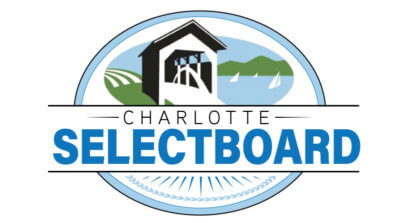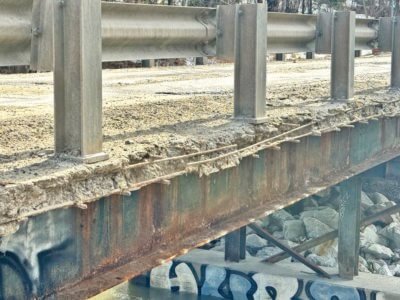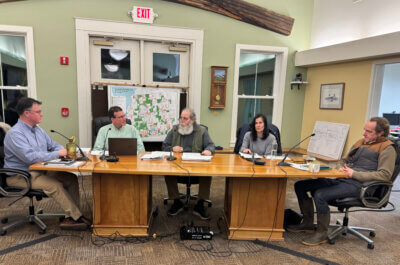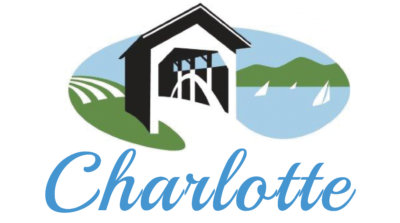Proposed town budget to be finalized Monday
The Charlotte Selectboard entered its meeting on Monday, Jan. 22, with the expectation that it would approve a municipal budget proposal for the next fiscal year, which begins on July 1.
But after three and half hours of small adjustments and continued debate, the evening concluded without such a vote.
Now, a special meeting will have to take place at 7 p.m. on Monday, Jan. 29, where the board will finalize a warning for Town Meeting Day. The question of what should appear on that warning — besides a budget of some kind — occupied much of the discussion on Monday, leading to a few unofficial decisions.
Town Meeting Day’s Australian ballot, it seems, will include Charlotte Volunteer Fire & Rescue’s request for a $365,000 10-year bond to fund the purchase of a new ambulance, which, according to CVFRS president John Snow, townspeople will begin to pay for “two or three years from now.” But the board shot down a potential article that would have sought to allocate an extra $50,000 in fiscal year 2025 to the Charlotte Trails Committee.
At the discretion of the voters, that would have added to an overall budget that, in its draft form, currently sits at $4,260,326 — already 4.65 percent more than the budget approved last year, an increase only partially offset by a $137,646 rise in non-tax revenues. Board members took issue with what they saw as the last-minute nature of the trails committee’s ask.
“I didn’t have any foreknowledge of this,” Kelly Devine said. “I have no ability to see what the typical requests have been over the years, what the balance is of their fund. I haven’t seen what capital projects they have planned.”
Bill Regan, who chairs the trails committee, objected to the board’s procedural critique.
“Actually, we’ve been discussing this article since last fall, at the start of the budgetary season, within the committee and with our selectboard liaisons,” Regan said. “We were told back in the fall that we should supply this information in January, in time for it to get onto the ballot. This should not be a surprise.”
Another member of the trails committee, Jack Pilla, explained that the money would allow for continued progress on a planned trail from Mount Philo to the town beach. Currently, it ends at Ferry Road. According to Pilla, the public has expressed consistent support for the project.
“This would be the fourth article we’ve asked for over the years to build a very specific trail,” Pilla said. “We really want to put it out there for the people to make the decision.”
For now, however, it appears that the Town Meeting Day agenda won’t task voters with considering any immediate spending beyond the town’s base budget, unless a citizen petition gathers signatures amounting to 5 percent of the local electorate. The town clerk would have to receive them by Jan. 29, which wouldn’t leave much time for door-knocking.
Even so, according to selectboard member Lewis Mudge, it’s “not too late” to try. That goes not only for the trails committee but also for the recreation commission — one of whose members, Maura O’dea-Wygmans, advocated unsuccessfully for a $30,000 boost to its reserve fund.
O’dea-Wygmans told the board that the commission doesn’t have enough cash on hand to fulfill Charlotte’s longstanding commitment to improving accessibility at the town beach by installing a ramp. By her account, the cost of the project had doubled between the completion of the design and the disbursal of funding.
“We’re at the very end of this process,” selectboard chair Jim Faulkner replied. “Why are we talking about this now if we started in September?”
Charlotte’s town meeting will take place on Saturday, March 2. What we do know so far is that Charlotters will approve or reject the budget in the traditional fashion — from the floor at Charlotte Central School — before weighing in on additional articles by Australian ballot 7 a.m.-7 p.m. on March 5 at town hall.
That plan almost changed on Monday amid concerns over in-person turnout, as the selectboard noted complaints from residents with schedule conflicts and overlapping vacations, owing to a winter break at the local schools. Devine also cited a high COVID-19 rate.
“The difference between town meeting and Australian ballot is eight or nine hundred voters,” said Mary Mead, the town clerk and treasurer.
Devine’s motion to switch fully to an Australian ballot this March, supported by Faulkner, failed in a tie vote, with Frank Tenney and Lewis Mudge in opposition.
“I was the No. 1 proponent of Australian ballot last year, but we got a bunch of flak for it,” Mudge said. “I don’t want us to vacillate on this.”
Related Stories
Popular Stories
If you enjoy The Charlotte News, please consider making a donation. Your gift will help us produce more stories like this. The majority of our budget comes from charitable contributions. Your gift helps sustain The Charlotte News, keeping it a free service for everyone in town. Thank you.
Bill Regan, Chair, Board of Directors







